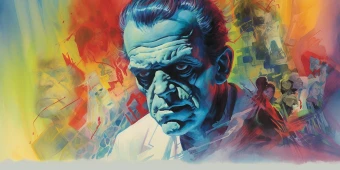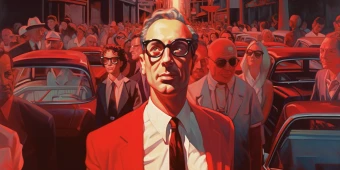by Franz Kafka


The Metamorphosis: Plot Summary
Table of contents
- Full Book Summary
- Plot Summary by Chapters
- Part I
- Part II
- Part III
Full Book Summary
The Metamorphosis tells the story of Gregor Samsa, a traveling salesman who wakes up one morning to find himself transformed into a giant insect. His family is horrified by his new appearance, and they lock him in his bedroom, where he spends most of his time hidden under the furniture.
As the story progresses, Gregor’s family becomes more and more resentful of him. His sister, Grete, initially cares for him, but she soon becomes tired of the responsibility and begins to ignore him. The family’s financial situation worsens as Gregor can no longer work and provide for them. They take in boarders to make ends meet, which adds to the tension in the household.
One day, Grete decides that they must get rid of Gregor, and the family agrees. They remove all the furniture from his room, which greatly upsets him, and he crawls onto the wall and ceiling for comfort. When the boarders see him, they become alarmed and decide to leave the apartment immediately.
Gregor’s father becomes fed up with the situation and decides to get rid of Gregor himself. He throws apples at him, and one becomes lodged in his back. Gregor is severely injured and begins to die. His family finds him and, instead of feeling sorrow or regret, they feel a sense of relief. They decide to move to a new apartment and start a new life without Gregor.
Plot Summary by Chapters
Part I
The story begins with Gregor Samsa, a traveling salesman, waking up to discover that he has transformed into a giant insect. Shocked by his new form, he struggles to get out of bed and finds that his movements have become awkward and clumsy. As he tries to get dressed for work, his family members – his mother, father, and sister – attempt to open his door, but Gregor is unable to communicate with them and his appearance terrifies them.
Despite his inability to communicate, Gregor manages to understand that he has missed his train and will be late for work. As he tries to make his way out of his room, he accidentally knocks over a picture frame, causing his family members to become even more upset. When he finally makes it to the living room, he sees that his boss has arrived to inquire about his absence from work. Gregor’s father explains the situation and the boss expresses his dissatisfaction with Gregor’s work and his attitude.
Part II
After the events of the previous day, Gregor finds that he is unable to move his body and is confined to his room. His sister, Grete, takes on the responsibility of caring for him and tries to feed him, but Gregor is unable to eat the food she provides. He spends his days listening to his family members talk about their financial difficulties and the burden that he has become on them.
As time passes, Gregor begins to lose his connection to his humanity and becomes more insect-like. He finds pleasure in crawling on the walls and ceiling of his room and enjoys the taste of rotting food. One day, Grete decides that they should remove the furniture from Gregor’s room to give him more space to move around. This further isolates Gregor and he begins to feel more alone and abandoned.
Part III
Gregor’s deteriorating condition takes a turn for the worse when his father becomes increasingly hostile towards him. Gregor’s mother and sister try to protect him, but they are unable to stand up to his father’s aggressive behavior. One day, Gregor’s father throws an apple at him, injuring him and causing him to retreat back into his room.
After this incident, Gregor’s family decides that they can no longer tolerate his presence and they begin making plans to get rid of him. Grete declares that Gregor is no longer their brother and his parents agree to call in a specialist to remove him from the house. Gregor overhears their conversation and realizes that he is no longer wanted by his family.
As the story comes to a close, Gregor dies from his injuries and his family members are relieved to be rid of him. They look forward to starting a new life, free from the burden of caring for Gregor. However, they are left to contemplate the guilt and regret that they feel for how they treated him in his final days.

- Instructions Followed To The Letter
- Deadlines Met At Every Stage
- Unique And Plagiarism Free


 Frankenstein
Frankenstein
 Othello
Othello
 A Good Man is Hard to Find
A Good Man is Hard to Find